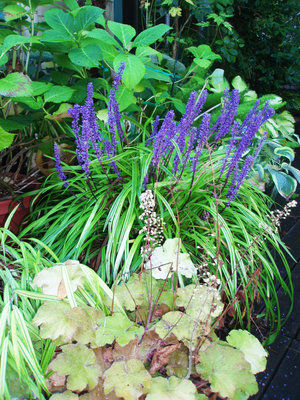
“May your trails be crooked, winding, lonesome, dangerous, leading to the most amazing view. May your mountains rise into and above the clouds. May your rivers flow without end … down into a desert of red rock … where something strange and more beautiful and more full of wonder than your deepest dreams waits for you.” — Edward Abbey
A friend and fellow columnist, Carol Carson, ends her e-mails with this quote, and it never fails to get me to thinking and appreciating this place, this planet we call home. I hope you enjoy it, too. And then I hope you’ll enjoy some time in the garden. Here are some tips for this month:
Now that we’ve had a bit of rain, it’s time to get serious about fall planting. One could almost hear the landscape sigh with relief and drink up when the first drops started to fall. Everything looks brighter and more vivid now. I can even get a shovel in the earth to turn over the soil in those dry spots where I’d love to plant a new tree or shrub. The soil is still warm and will nurture new root growth. It’s a good time to plant a new fruit tree, an edible shrub like a blueberry or maybe even something with beautiful fall color.
I’ve got my eye on a new “Sango-kaku” Japanese maple. Their upright growth is perfect for the smaller garden or that nook near the entry that needs an accent. They are one of the earliest maples to start coloring in fall and make quite a statement in the garden when combined with warm-toned foliage plants, like heuchera “Creme Brulee,” and fall-blooming plants, like liriope.
Other early fall color I’m seeing these days comes from Chinese pistache and liquidambar trees. Deciduous viburnums, like my favorite doublefile viburnum, have beautiful bright red foliage now, too.
The recent rains will allow weed seeds to sprout, which is just what you want if you’re planning a wildflower meadow. The most common mistake when planting wildflower seeds is not getting rid of the existing weed and grass seeds that are in the soil and will germinate along with the wildflowers. These fast-growing weeds smother the slower-growing wildflowers.
Take time to eliminate the competition. Get rid of existing weeds when they sprout by cultivating the soil to a depth of not more than 1 inch. Deeper cultivation exposes more weed seeds that will germinate along with the wildflower seeds.
Don’t prune now, you’ll be happy to hear. Fall is not a good time to prune. Wounds heal slowly, leaving them more susceptible to disease. As a general rule, don’t prune when leaves are falling or forming. Wait to prune most trees until late in the dormant season or in late spring, after leaves and needles form. To avoid sap flow on birches and maples, prune after leaves mature.
Other to-dos for early fall
– Rake leaves, and compost them or put them into your green can. If large leaves are left in place, they will mat down and set up fungal problems come spring.
– If you have a lawn, give it a feeding low in nitrogen but higher in phosphorus and potassium (the latter two numbers on the box or bag).
– Clean up spent plant material. The early rain might have caused powdery mildew to take hold on your squash or late blight on the tomatoes. Do not compost these in your own compost pile.
– Set out native plants. They’ll love the winter rains to become established.
– Bring in houseplants from outside around Halloween, but make sure to check for bugs first.
– Cultivate around beds, trees and shrubs so rains can penetrate. Add chicken manure around fruit trees so they are ready to go next spring.
Jan Nelson, a landscape designer and California certified nursery professional, will answer questions about gardening in the Santa Cruz Mountains. E-mail her at ja******@*ol.com, or visit www.jannelsonlandscapedesign.com to view past columns and pictures.












